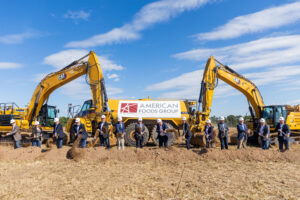Editor’s Note: Kate Burke is founder of Think Agri, a consultancy firm based in Melbourne, Australia. Burke has a background in farm advisory services and commercial management in corporate agriculture and is on a mission to fill the education gap between corporates and farmers, investors and agribusinesses. Here she writes about the potential for the corporate world to learn from the ag world and vice versa.

Astute agtech investors and entrepreneurs recognize that understanding the intricacies of farming and agriculture will provide a competitive advantage to any new agtech venture.
But, as noted in a recent AgFunderNews article, it can be a challenge for investors to become comfortable with the unique features of an agricultural investment and confident enough to invest. Similarly, consultancy group BDO listed the lack of fund managers with specific agricultural knowledge as a major barrier to investment in the local agriculture sector by Australia’s superannuation industry. Investors will benefit from understanding the intricacies of farming and agriculture, according to a recent ANZ report, and this is where education comes in.
Both agricultural businesses and farmers need to learn more about each other.
Several studies of successful farm businesses reach the same conclusion: highly effective farm businesses are technically good at farming, profit-focused, and good at dealing with the people they do business with. Insights such as these are not only useful for farmers endeavoring to improve their businesses, but they’re also useful to the non-ag sector looking to engage with the ag sector.
Similarly, farm businesses have much to gain from understanding corporate business practices and adopting processes that may strengthen their business.
What corporates can teach family farms:
The culture of corporate governance and professionalism is a key strength of the corporate world as it creates discipline around decision making and reporting.
Aspects of corporate governance apply to family farms although this is not always recognized.
Decision making on some family farms could be improved by using governance discipline and considering stakeholders when making big decisions or ensuring compliance, for example:
- Capital expenditure– land, machinery, and technology, infrastructure.
- Major inputs- fertilizer and chemical.
- Formalisation of policies
- Formal communications when more than two people are involved in the business
- Grain marketing strategy.
- Financial monitoring and reporting.
- Succession planning.
- Long term strategic decisions that could potentially impact future generations.
This may sound business as usual for the corporate and financial services sector, but it is not always the case out on the farm.
Corporate culture has a strong emphasis on risk management
Farm culture is one of trust and handshake agreements are still very common. Family farms could benefit from stronger risk management procedures that are routine business practices in the corporate sector. Areas where documented risk management policies are sometimes lacking on the farm include:
- Workplace, health, and safety.
- Business counterparty risk, especially in commodity sales.
- Commodity price risk.
- Production risk and input decision making.
Examples
1. Utilizing written agreements rather than handshake deals for business matters such as land leasing or share farming, engaging contractors or employees.
2. Conducting credit checks on potential grain buyers. If the price seems too good to be true, it probably is. Better to take the slightly lower bid and receive your money.
3. Using all available resources to determine potential production scenarios to assist in grain selling plans and crop management decisions, including cash flow and budget revisions.
What family farms can teach corporates:
Family farms tend to be intuitive, flexible, and can respond quickly to change which is a key strength.
Good organization and timely, intuitive and adaptive decision making are key strengths of high performing farm businesses. The small business structure of family farms allows this flexibility.
Knowledge is built up over generations of experience. Rules of thumb and intuition based on this intimate knowledge guide decision making and anticipation of likely outcomes.
Things change rapidly in the farm sector; weather changes, commodity prices cycle, diseases, and pests can appear from nowhere. At the same time, opportunities to make serious money can emerge without much warning. The ability to adapt to seasonal and market trends is essential.
The rigorous business procedures that create good corporate governance and risk management can create layers of complexity and slow down decision making. Balancing this with the need for rapid decision-making and flexibility is challenging.
The financial models of any new start-up or corporate venture are important tools but can be dangerous and misleading without sanity checks based on experience and knowledge.
Investors, analysts, and entrepreneurs who understand that ag is a complex, fast moving beast governed by many external influences will outperform their competitors. Forward planning and scenario analyses are essential, and depth of knowledge in the target sector ensures being able to anticipate what might be ahead.
In summary: the ag sector can teach investors and entrepreneurs that:
- Intuition based on experience is valuable
- Farming is complex and detailed with nuances that can’t always be modeled.
- Time is money; structures and process need to enable timeliness, flexibility, and nimbleness.
The corporate sector can teach farmers how to be:
- Business focused
- Disciplined in documentation and reporting
- Better risk managers
What do you think? Email [email protected]





